If you were to go just by the commercials, you'd think George Miller's new animated offering, Happy Feet, was one big party movie with wall-to-wall singing and dancing penguins.
What's striking when you see the full film is that Happy Feet contains a strong environmental message that would make Al Gore's heart sing. In the middle of a movie that is, in Robin Williams' words, Riverdance meets March of the Penguins, you have plot points turning on the effects of over fishing, global warming and the fragility of the food chain in Antarctica.
"You can't tell the story of penguins without dealing with the environment," Miller says. "In some sense, Happy Feet is an appeal to humans' better nature. That's what the main character, Mumbles, sets out to do. Because we're all responsible for these amazing creatures."
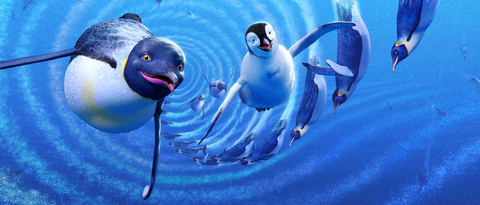
PHOTOS COURTESY OF WARNER BROS
Mumbles (voiced by Elijah Wood) is an emperor penguin born without the ability to sing. If you were one of the millions who saw last year's documentary smash March of the Penguins, you might remember that Antarctica's emperor penguins find their mates and distinguish each other through what's called their "heartsong."
Thus, Mumbles' affliction is viewed as a problem, except by Mumbles.
Because all he wants to do is dance. (Mumbles' tap-dancing came from the filmmakers doing motion-capture work with virtuoso tap dancer Savion Glover.)
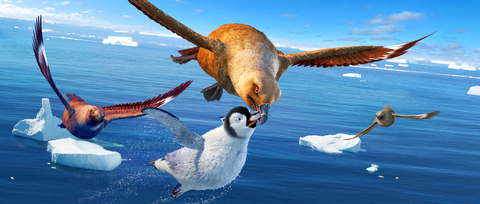
That message of the importance of individuality makes Happy Feet indistinguishable from most other family fare. But Mumbles' journey to happiness takes him to some authentically dark places, leading him to confront the actions of what he and his brethren call the "ugly penguins without feathers on their fat, flabby faces."
Australia's Miller has been down this road before. He was one of the writers and producers of the 1995 Oscar-nominated family film, Babe, where the specter of the ax in the family-farm food chain was never far from the surface.
Miller took 1998 sequel Babe: Pig in the City a step further, moving from the gentle, pastoral charm of the original to a movie disturbing in tone, European art house in feel.
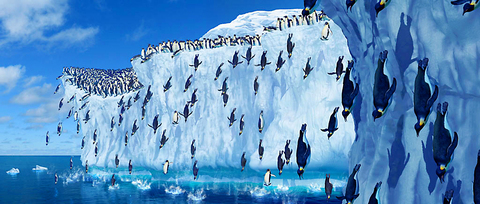
Not surprisingly, Pig in the City bombed with audiences, grossing only US$18 million in the states. (Miller calls the movie's commercial failure "self-inflicted." He delivered the film to the studio late, giving the marketing department little time to prepare audiences for the tonal shift.)
"The moral darkness of Pinocchio and Snow White are huge to me," Miller says. "Happy Feet has a lot in common with Dumbo, another one of my favorites. These dark stories help us negotiate life. They're for the adult in the child and the child in the adult."
Adds Wood: "Life isn't sanitized. I like that the movie throws in a little dark reality."
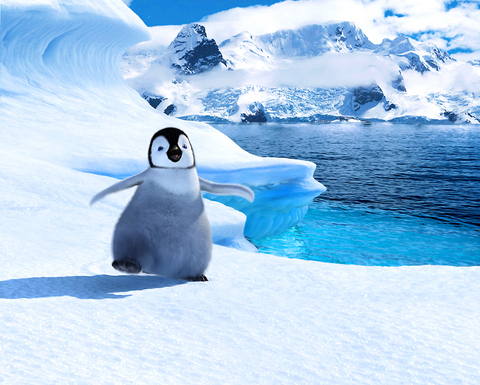
For the Antarctic penguins in Happy Feet, that reality includes ocean waters where fish aren't swimming and ice temperatures that are, relatively speaking, sweltering. One penguin, Lovelace (voiced by Williams), wears a plastic six-pack ring around his neck.
Initially, the other penguins see the ring as an exotic talisman, a sign of Lovelace's power. Then Lovelace begins to have trouble breathing, and Mumbles realizes something more sinister is at hand.
"To George's credit, it's funny and ridiculous and heartbreaking, all at the same time," says Brittany Murphy, who voices Gloria, Mumbles' singing love interest. "The message is there, but he isn't beating you over the head with it. It is unexpected, though. Most people are just expecting happy penguins."
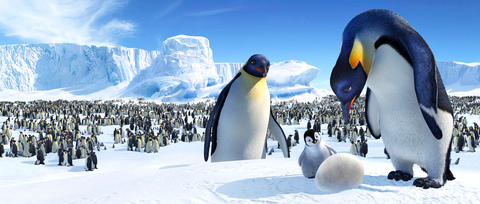
Miller was developing Happy Feet several years before the success of March of the Penguins. Initially, it wasn't planned as a musical. Nor was it intended to tell a story about the environment where the lead penguin rails to the humans: "Why are you taking our fish? You're causing an awful lot of grief!"
Miller just liked emperor penguins, finding their existence nothing short of incredible.
"I was struck by he way they live in community and share the load," he says. "Their incredible efficiency. The way they waddle on land but then virtually fly underwater.
"These penguins don't have to sing and dance," Miller adds. "They're amazing all on their own. I'd love for people to feel that and feel their responsibility to care for these creatures and their environment. They have such a tenuous hold on life. You can't take them for granted."

Behind a car repair business on a nondescript Thai street are the cherished pets of a rising TikTok animal influencer: two lions and a 200-kilogram lion-tiger hybrid called “Big George.” Lion ownership is legal in Thailand, and Tharnuwarht Plengkemratch is an enthusiastic advocate, posting updates on his feline companions to nearly three million followers. “They’re playful and affectionate, just like dogs or cats,” he said from inside their cage complex at his home in the northern city of Chiang Mai. Thailand’s captive lion population has exploded in recent years, with nearly 500 registered in zoos, breeding farms, petting cafes and homes. Experts warn the

The unexpected collapse of the recall campaigns is being viewed through many lenses, most of them skewed and self-absorbed. The international media unsurprisingly focuses on what they perceive as the message that Taiwanese voters were sending in the failure of the mass recall, especially to China, the US and to friendly Western nations. This made some sense prior to early last month. One of the main arguments used by recall campaigners for recalling Chinese Nationalist Party (KMT) lawmakers was that they were too pro-China, and by extension not to be trusted with defending the nation. Also by extension, that argument could be

Aug. 4 to Aug. 10 When Coca-Cola finally pushed its way into Taiwan’s market in 1968, it allegedly vowed to wipe out its major domestic rival Hey Song within five years. But Hey Song, which began as a manual operation in a family cow shed in 1925, had proven its resilience, surviving numerous setbacks — including the loss of autonomy and nearly all its assets due to the Japanese colonial government’s wartime economic policy. By the 1960s, Hey Song had risen to the top of Taiwan’s beverage industry. This success was driven not only by president Chang Wen-chi’s

Last week, on the heels of the recall election that turned out so badly for Taiwan, came the news that US President Donald Trump had blocked the transit of President William Lai (賴清德) through the US on his way to Latin America. A few days later the international media reported that in June a scheduled visit by Minister of National Defense Wellington Koo (顧立雄) for high level meetings was canceled by the US after China’s President Xi Jinping (習近平) asked Trump to curb US engagement with Taiwan during a June phone call. The cancellation of Lai’s transit was a gaudy